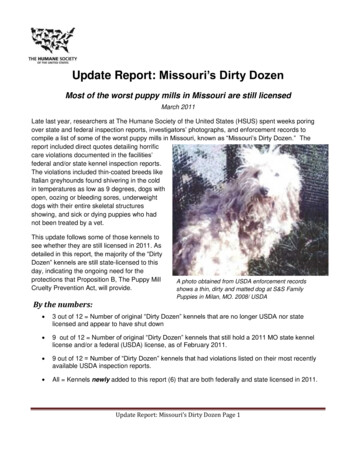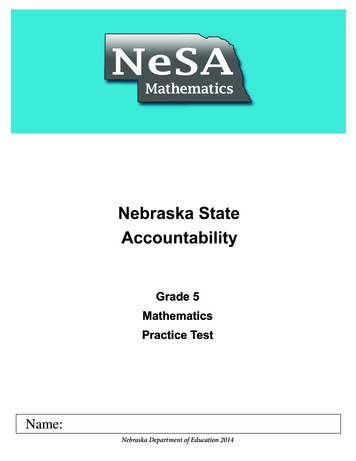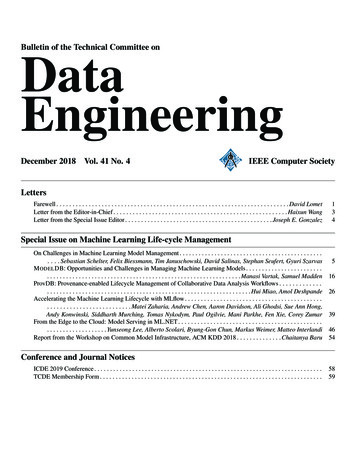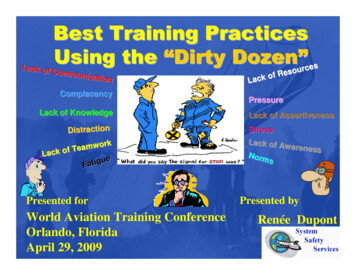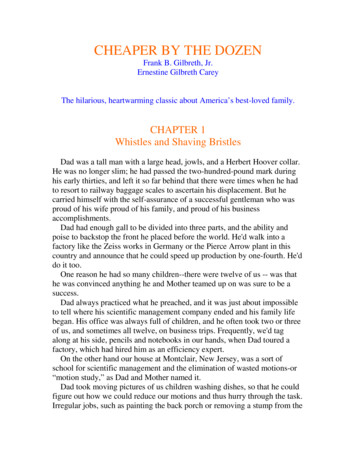
Transcription
CHEAPER BY THE DOZENFrank B. Gilbreth, Jr.Ernestine Gilbreth CareyThe hilarious, heartwarming classic about America’s best-loved family.CHAPTER 1Whistles and Shaving BristlesDad was a tall man with a large head, jowls, and a Herbert Hoover collar.He was no longer slim; he had passed the two-hundred-pound mark duringhis early thirties, and left it so far behind that there were times when he hadto resort to railway baggage scales to ascertain his displacement. But hecarried himself with the self-assurance of a successful gentleman who wasproud of his wife proud of his family, and proud of his businessaccomplishments.Dad had enough gall to be divided into three parts, and the ability andpoise to backstop the front he placed before the world. He'd walk into afactory like the Zeiss works in Germany or the Pierce Arrow plant in thiscountry and announce that he could speed up production by one-fourth. He'ddo it too.One reason he had so many children--there were twelve of us -- was thathe was convinced anything he and Mother teamed up on was sure to be asuccess.Dad always practiced what he preached, and it was just about impossibleto tell where his scientific management company ended and his family lifebegan. His office was always full of children, and he often took two or threeof us, and sometimes all twelve, on business trips. Frequently, we'd tagalong at his side, pencils and notebooks in our hands, when Dad toured afactory, which had hired him as an efficiency expert.On the other hand our house at Montclair, New Jersey, was a sort ofschool for scientific management and the elimination of wasted motions-or“motion study,” as Dad and Mother named it.Dad took moving pictures of us children washing dishes, so that he couldfigure out how we could reduce our motions and thus hurry through the task.Irregular jobs, such as painting the back porch or removing a stump from the
front lawn, were awarded on a low-bid basis. Each child who wanted extrapocket money submitted a sealed bid saying what he would do the job for.The lowest bidder got the contract.Dad installed process and work charts in the bathrooms. Every child oldenough to write - and Dad expected his offspring to start writing at a tenderage - was required to initial the charts in the morning after he had brushedhis teeth, taken a bath combed his hair, and made his bed. At night eachchild had to weigh himself, plot the figure on a graph, and initial the processcharts again after he had done his homework washed his hands and face, andbrushed his teeth Mother wanted to have a place on the charts for sayingprayers, but Dad said as far as he was concerned prayers were voluntary.It was regimentation, all right. But bear in mind the trouble most parentshave in getting just one child off to school, and multiply it by twelve. Someregimentation was necessary to prevent bedlam. Of course there were timeswhen a child would initial the charts without actually having fulfilled therequirements. However, Dad had a gimlet eye and a terrible swift sword.The combined effect was that truth usually went marching on.Yes, at home or on the job, Dad was always the efficiency expert. Hebuttoned his vest from the bottom up; instead of from the top down, becausethe bottom-to-top process took him only three seconds, while the top tobottom took seven. He even used two shaving brushes to lather his facebecause he found that by so doing he could cut seventeen seconds of hisshaving time. For a while he tried shaving with two razors, but he finallygave that up.“I can save forty-four seconds,” he grumbled, “but I wasted two minutesthis morning putting this bandage on my throat.”It wasn't the slashed throat that really bothered him. It was the twominutes.Some people used to say that Dad had so many children he couldn't keeptrack of them, Dad himself used to tell a story about one time when Motherwent off to fill a lecture engagement and left him in charge at home. WhenMother retuned, she asked him if everything had run smoothly.“Didn't have any trouble except with that one over there,” he replied. “Buta spanking brought him into line.”Mother could handle any crisis without losing her composure.“That’s not one of ours, dear,” she said. “He belongs next door.”None of us remember it and maybe it never happened. Dad wasn't abovestretching the truth because there was nothing he liked better than a joke,particularly if it were on him and even more particularly if it were on
Mother. This much is certain though. There were two red-haired childrenwho lived next door, and the Gilbreth’s all are blondes or red heads.Although he was a strict taskmaster within his home, Dad tolerated nocriticism of the family from outsiders. Once a neighbor complained that aGilbreth had called the neighbor's boy a son of an unprintable word.“What are the facts of the matter?” Dad asked blandly. And then walkedaway while the neighbor registered a double takeBut Dad hated unprintable words, and the fact that he had stood up for hisson didn't prevent him from holding a full-dress court of inquiry once he gothome, and administering the called-for punishment.Dad was happiest in a crowd, especially a crowd of kids. Whereas he was,you'd see a string of them trailing him - and the ones with plenty of freckleswere pretty sure to be Gilbreths.He had a way with children and knew how to keep them on their toes. Hehad a respect for them, too, and didn't mind showing it.He believed that most adults stopped thinking the day they left school-andsome even before that. “A child, on the other hand, stays impressionable andeager to learn. Catch one young enough,” Dad insisted, “and there's no limitto what you can teach.”Really, it was love of children more than anything else that made himwant a pack of his own. Even with a dozen, he wasn’t fully satisfied.Sometimes he'd look us over and say to Mother:“Never you mind, Lillie. You did the best you could.”We children used to suspect, though, that one reason he had wanted a largefamily was to assure himself of an appreciative audience, even within theconfines of the home. With us around, he could always be sure of a fullhouse, packed to the galleries.Whenever Dad returned from a trip-even if he had been gone only a day-he whistled the family “assembly call” as he turned in at the sidewalk of ourlarge, brown home in Montclair. The call was a tune he had composed. Hewhistled it loud and shrill, by doubling his tongue behind his front teeth. Ittook considerable effort and Dad, who never exercised if he could help it,usually ended up puffing with exhaustion.The call was important. It meant drop everything and come running--orrisk dire consequences. At the first note Gilbreth children came dashingfrom all corners of the house and yard. Neighborhood dogs, barkinghellishly, converged for blocks around. Heads popped out of the windows ofnear-by houses.
Dad gave the whistle often. He gave it when he had an important familyannouncement that he wanted to be sure everyone would hear. He gave itwhen he was bored and wanted some excitement with his children. He gaveit when he had invited a friend home and wanted both to introduce the friendto the whole family and to show the friend how quickly the family couldassemble. On such occasions, Dad would click a stopwatch, which healways carried in his vest pocket.Like most of Dad's ideas, the assembly calls, while something more thannuisance made sense. This was demonstrated in particular one day when abonfire of leaves in the driveway got out of control and spread to the side ofthe house. Dad whistled, and the house was evacuated in fourteen seconds-eight seconds off the all-time record. That occasion also was memorablebecause of the remarks of a frank neighbor, who watched the blaze from hisyard. During the height of the excitement the neighbor's wife came to thefront door and called to her husband:“What’s going on?”The Gilbreths' house is on fire,” he replied, “thank God!”“Shall I call the fire department?” she shouted.“What's the matter, are you crazy?” the husband answered incredulously.Anyway, the fire was put out quickly and there was no need to ask the firedepartment for help.Dad whistled assembly when be wanted to find out who had been usinghis razor or who had spilled ink on his desk. He whistled it when he hadspecial jobs to assign or errands to be run. Mostly, though, he sounded theassembly call when he was about to distribute some wonderful surprises,with the biggest and best going to the one who reached him first.So when we heard him whistle, we never knew whether to expect goodnews or bad, rags or riches. But we did know for sure we'd better get there ina hurry.Sometimes as we all came running to the front door, he'd start by beingstern.“Let me see your nails, all of you,” he'd grunt, with his face screwed up ina terrible frown. “Are they clean? Have you been biting them? Do-they needtrimming?”Then out would come leather manicure sets for the girls and pocketknivesfor the boys. How we loved him then, when his frown wrinkles reversedtheir field and became a wide grinOr he'd shake hands solemnly all around, and when you took your handaway there'd be a nut chocolate bar in it. Or he'd ask who had a pencil andthen hand out a dozen automatic ones.
“Let’s see, what time is it?” he asked once. Out came wristwatches for alleven the six-week-old baby.“Oh Daddy, they're just right,” we’d say.And when we'd throw our arms around him and tell him how we'd missedhim, he would choke up and wouldn't be able to answer. So he'd rumple ourhair and slap our bottoms instead.CHAPTER 2Pierce ArrowThere were other surprises, too. Boxes of Page and Shaw candy, dolls andtoys, cameras from Germany, wool socks from Scotland, a dozen PlymouthRock hens, and two sheep that were supposed to keep the lawn trimmed butdied, poor creature from the combined effects of saddle sores, too muchpetting and tail pulling. The sheep were fun while they lasted, and it isdoubtful if any pair of quadrupeds ever had been sheared so often by somany.“If I ever bring anything else alive into this household,” Dad said,” I hopethe Society for the Prevention of Cruelty to Animals hales me into court andmakes me pay my debt to society. I never felt so ashamed about anything inmy life as I do about those sheep. So help me.”When Dad bought the house in Montclair, he described it to us as atumbled-down shanty in a run-down neighborhood. We thought this wasanother one of his surprises, but be finally convinced us that the home was ahovel.“It takes a lot of money to keep this family going,” he said.“Food, clothes, allowances, doctors' bills, getting teeth straightened, andbuying ice cream sodas. I'm sorry, but I just couldn't afford anything better.We'll have to fix it up the best we can, and make it do.”We were living at Providence Rhode Island, at the time. As we drovefrom Providence to Montclair, Dad would point to every termite-trap wepassed.“It looks something like that one,” he would say, “only it has a few morebroken windows, and the yard is maybe a little smaller.”
As we entered Montclair, he drove through the poor section of town, andfinally pulled up at an abandoned structure that even Dracula wouldn't havefelt at home in.“Well, here it is,” he said. “Home. All out.”'You’re joking, aren't you dear?” Mother said hopefully.“What's the matter with it? Don't you like it?”“If it's what you want dear,” said Mother, “I'm satisfied, I guess.”“It's a slum, that's what's the matter with it,” said Ernestine.“No one asked your opinion, young lady,” replied Dad. “I was talking toyour Mother, and I will thank you to keep out of the conversation.”“You're welcome,” said Ernestine, who knew she was treading on thin icebut was too upset to care. “You’re welcome, I'm sure. Only I wouldn't live init with a ten-foot pole.”“Neither would I,” said Martha “Not with two ten-foot poles.”“Hush,” said Mother. “Daddy knows best.”Lill started to sob.“It won't look so bad with a coat of paint and a few boards put in wherethese holes are,” Mother said cheerfully.Dad grinning now, was fumbling in his pocket for his notebook.“By jingo, kids, wait a second,” he crowed. “Wrong address. Well, whatdo you know? Pile back in. I thought this place looked a little more rundown than when I last saw it.”And then he drove us to 68 Eagle Rock Way, which was a old butbeautiful Taj Mahal of a house with fourteen rooms a two-story barn outback a greenhouse, chicken yard, grape arbors rose bushes, and a couple ofdozen fruit trees. At first we thought that Dad was teasing us again, and thatthis was the other end of a scale-a house much better than the one he hadbought.“This is really is,” he said. 'The reason I took you to that other place first,and the reason I didn't try to describe this place to you is--well, I didn't wantyou to be disappointed. Forgive me!”We said we did.Dad had bought the automobile a year before we moved. It was our firstcar, and cars still were a novelty. Of course, that had been a surprise, too. Hehad taken us all for a walk and had ended up at a garage where the car hadbeen parked.Although Dad made his living by redesigning complicated machinery, soas to reduce the number of human motions required to operate it he neverreally understood the mechanical intricacies of our automobile. It was a gray
Pierce Arrow, equipped with two bulb horns and an electric Klaxon, whichDad would try to blow all at the same time when he wanted to pass anyone.The engine hood was long and square, and you had to raise it to prime thepetcocks on cold mornings.Dad had seen the car in the factory and fallen in love with it. The affectionwas entirely one-sided and unrequited. He named it Foolish Carriagebecause he said, it was foolish for any man with as many children as he tothink he could afford a horseless carriage.The contraption kicked him when he cranked, spat oil in his face when helooked into its bowels, squealed when he mashed the brakes, and rumbledominously when he shifted gears. Sometimes Dad would spit squeal, andrumble back. But he never won a single decision.Frankly, Dad didn't drive our car well at all. But he did drive it fast. Heterrified all of us, but particularly Mother. She sat next to him on the frontseat--with two of the babies on her lap and alternated between clutchingDad's arm and closing her eyes in supplication. Whenever we rounded acorner, she would try to make a shield out of her body to protect the babiesfrom what she felt sure would be mutilation or death.“Not so fast, Frank, not so fast,” she would whisper through clenchedteeth. But Dad never seemed to hear.Foolish Carriage was a right-hand drive, so whoever sat to the left ofMother and the babies on the front seat had to be on the lookout to tell Dadwhen he could pass the car ahead.''You can make it,” the lookout would shout.“Put out your hand,” Dad would holler.Eleven hands-everybody contributing one except Mother and the babieswould emerge from both sides of the car; from the front seat rear seat andfolding swivel chairs amid-ships. We had seen Dad nick fenders, slaughterchickens square away with traffic policemen, and knock down full-growntrees and we weren't taking any chances. The lookout on the front seat wasDad's own idea. The other safety measures, which we soon inaugurated as amatter of self-preservation, were our own.We would assign someone to keep a lookout for cars approaching on sidestreets to the left; someone to keep an identical lookout to the right; andsomeone to kneel on the rear seat and look through the isinglass window inthe back.“Car coming from the left, Dad,” one lookout would sing out.“Two coming from the right.”“Motorcycle approaching from astern.”
“I see them, I see them,” Dad would say irritably, although usually hedidn’t. “Don't you have any confidence at all in your father?”He was especially fond of the electric horn, an ear-splitting gadget whichbellowed “kadookah” in an awe-inspiring metallic baritone. How Dad couldmanage to blow this and the two bulb horns, step on the gas, steer the car,shout “road hog, road hog” and smoke a cigar-- all at the same time-- is initself a tribute to his abilities as a motion study expert.A few days after he bought the car, he brought each of us children up to it,one at a time, raised the hood, and told us to look inside and see if we couldfind the birdie in the engine, While our backs were turned he'd tiptoe back tothe driver's seat--a jolly Santa Claus in mufti and press down on the horn.“Kadookah, Kadookah.” The horn blaring right in your ear wasfrightening and you'd jump away in hurt amazement. Dad would laugh untilthe tears came to his eyes.“Did you see the birdie? Ho, ho, ho,” he'd scream. “I'll bet you jumped sixand nine-tenths inches. Ho, ho, ho.”One day, while we were returning from a particularly trying picnic, theengine balked, coughed, spat, and stopped.Dad was sweaty and sleepy. We children had gotten on his nerves. Heordered us out of the car, which was overheated and steaming. He wrestledwith the back seat to get the tools. It was stuck and he kicked it. He took offhis coat, rolled op his sleeves, and raised the left-hand side of the hood.Dad seldom swore. An occasional “damn,” perhaps, but he believed insetting a good sample. Usually he stuck to such phrases as “by jingo” and“holy Moses.” He said them both now; only there was something frighteningin the way he rolled them out.His head and shoulders disappeared into the inside of the hood. You couldsee his shirt wet through, sticking to his back.Nobody noticed Bill. He had crawled into the front seat and then“Kadookaa, Kadookah”Dad jumped so high he actually toppled into the engine, leaving his feetdangling in mid-air. His head butted the top of the hood and his right wristcame up against the red-hot exhaust pipe. You could hear the flesh sizzle.Finally he managed to extricate himself. He rubbed his head, and left greaseacross his forehead. He blew on the burned wrist. He was livid.“Jesus Christ!” he screamed, as if he had been saving this oath since hiswedding day for just such an occasion. “Holy Jesus Christ Who did that?”“Mercy, Maud,” said Mother, which was the closest she ever came toswearing too.
Bill, who was six and always in trouble anyway, was the only one withnerve enough to laugh. But it was a nervous laugh at that.“Did you see the birdie, Daddy?” he asked.Dad grabbed him, and Bill stopped laughing.“That was a good joke on you, Daddy,” Bill said hopefully.But there wasn't much confidence in his voice.“There is a time,” Dad said through his teeth, “and there is a place forbirdies. And there is a time and place for spankings.”“I’ll bet you jumped six and nine-tenths inches, Daddy,” said Bill, stallingfor time, now.Dad relaxed and let him go. “Yes, Billy, by jingo,” he said“That was a good joke on me, and I suspect I did jump six and nine-tenthsinches.”Dad loved a joke on himself, all right. But he loved it best a few monthsafter the joke was over, and not when it was happening. The story about Billand the birdie became one of his favorites. No one ever laughed harder at theend of the story than Dad. Unless it was Bill. By jingo.CHAPTER 3Orphans in UniformWhen Dad decided he wanted to take the family for an outing in thePierce Arrow, he'd whistle assembly, and then ask:“How many want to go for a ride?”The question was purely rhetorical, for when Dad rode, everybody rode.So we'd all say we thought a ride would be fine.Actually, this would be pretty close to the truth. Although Dad's drivingwas fraught with peril, there was a strange fascination in its brushes withdeath and its dramatic, traffic stopping scenes. It was the sort of thing thatyou wouldn’t have initiated yourself, but wouldn't have wanted to miss. Itwas standing up in a roller coaster. It was going up on the stage when themagician called for volunteers. It was a back somersault off the high divingboard.A drive, too, meant a chance to be with Dad and Mother. If you werelucky even to sit with them on the front seat, there were so many of us andso few of them that we never could see as much of them as we wanted.Every hour or so, we'd change places so as to give someone else a turn in thefront seat with them.
Dad would tell us to get ready while he brought the car around to the frontof the house. He made it sound easy--as if it never entered his head thatFoolish Carriage might not want to come around front. Dad was a perpetualoptimist, confident that brains someday would triumph over inanimate steel;bolstered in the belief that he entered the fray with clean hands and a pureheartWhile groans, fiendish gargling and backfires were emitting from thebarn, the house itself would be organized confusion, as the family carriedout its preparations in accordance with prearranged plans. It was like anewspaper on election night; general staff headquarters on D-Day minusone.Getting ready meant scrubbed hands and face, shined shoes, clean clothes,and combed hair. It wasn't advisable to be late, if and when Dad finally camerolling up to the porte-cochere. And it wasn't advisable to be dirty becausehe'd inspect us all.Besides getting himself ready, each older child was responsible for one ofthe younger ones. Anne was in charge of Dan, Ern in charge of Jack andMart in charge of Bob. This applied not only to rides in the car but all thetime. The older sister was supposed to help her particular charge get dressedin the morning, to see that he made his bed, to put clean clothes on when heneeded them, to see that he was washed and on time for meals, and to seethat his process charts were duly initialed.Anne, as the oldest, also was responsible for the deportment and generalappearance of the whole group. Mother, of course, watched out for the baby,Jane. The intermediate children, Frank, Bill, Lill and Fred, were consideredold enough to look out for themselves, but not old enough to look afteranyone else. Dad, for the purpose of convenience (his own), ranked himselfwith the intermediate category.In the last analysis, the person responsible for making the system workwas Mother. Mother never threatened, never shouted or became excited,never spanked a single one of her children--or anyone else's, either.Mother was a psychologist. In her own way, she got even better resultswith the family than Dad. But she was not a disciplinarian. If it was alwaysDad, and never Mother, who suggested going for a ride Mother had herreasons.She'd go from room to room, settling fights, drying tears, buttoningjackets.“Mother, he's got my shirt. Make him give it to me.”“Mother, can I sit up front with you? I never get to sit up front.”“It's mine: you gave it to me. You wore mine yesterday.”
When we'd all gathered in front of the house, the girls in dusters, the boysin linen suits, Mother would call the roll. Anne, Ernestine, Martha, Frankand so forth.We used to claim that the roll-call was a waste of time and motion.Nothing was considered more of a sin in our home than wasted time andmotions. But Dad had two vivid memories about children who had been leftbehind by mistake.One such occurrence happened in Hoboken, aboard the liner Leviathan.Dad had taken the boys aboard on a sightseeing trip just before she sailed.He hadn't remembered to count noses when he came down the gangplank,and didn't notice, until the gangplank was pulled in, that Dan was missing.The Leviathan sailing was held up for twenty minutes until Dan was located,asleep in a chair on the promenade deck.The other occurrence was slightly more lurid. We were en route fromMontclair to New Bedford, Massachusetts, and Frank, Jr., was left behind bymistake in a restaurant in New London. His absence wasn't discovered untilnear the end of the trip.Dad wheeled the car around frantically and sped back to New London,breaking every traffic rule then on the books. We had stopped in the NewLondon restaurant for lunch, and it had seemed a respectable enough place.It was nighttime when we returned however, and the place was garish incolored lights. Dad left us in the car, and entered. After the drive in the dark,his eyes were squinted in the bright light, and he couldn't see very well. Buthe hurried back to the booths and peered into each one.A pretty young lady, looking for business, was drinking a highball in thesecond booth. Dad peered in, flustered.“Hello, Pops,” she said “Don't be bashful. Are you looking for a naughtylittle girl?”Dad was caught off guard.“Goodness, no,” he stammered, with all of his ordinary poise shattered.“I'm looking for a naughty little boy.”“Whoops, dearie,” she said “Pardon me.”All of us had been instructed that when we were lost we were supposed tostay in the same spot until someone returned for us, and Frank Jr., was foundeating ice cream with the proprietor's daughter, back in the kitchen.Anyway, those two experiences explain why Dad always insisted that theroll be called.As we'd line up in front of the house before getting into the car, Dadwould look us all over carefully.“Are you all reasonably sanitary?” he would ask.
Dad would get out and help Mother and the two babies into the front seat.He would pick up someone whose behavior had been especially good, andallow him to sit up front too, as the left-hand look-out. The rest of us wouldpile in the back exchanging kicks and punches under the protection of thelap robe as we squirmed around trying to make more room.Finally, off we'd start. Mother, holding the two babies, seemed to glowwith vitality. Her red hair, arranged in a flat pompadour, would begin toblow out in wisps from her hat. As long as we were still in town, and Dadwasn't driving fast, she seemed to enjoy the ride. She'd sit there listening tohim and carrying on a rapid conversation. But just the same her ears werestraining toward the sounds in the back seats, to make sure that everythingwas going all right.She had plenty to worry about too, because the more cramped we becamethe more noise we'd make. Finally, even Dad couldn't stand the confusion.“What’s the matter back there?” he'd bellow to Anne. “I thought I toldyou to keep everybody quiet.”“That would require an act of God,” Anne would reply bitterly.“You are going to think God is acting if you don't keep order back there. Isaid quiet and I want quiet.”“I'm trying to make them behave, Daddy. But no one will listen to me.”“I don't want any excuses; I want order. You're the oldest from now on Idon't want to hear a single sound from back there. Do you all want to walkhome?”By this time, most of us did, but no one dared say so.Things would quiet down for a while. Even Anne would relax and forgether responsibilities as the oldest. But finally there’d be trouble again, andwe’d feel pinches and kicks down underneath the robe.“Cut it out, Ernestine, you sneak,” Anne would hiss. “You take up all theroom,” Ernestine would reply. “Why don't you move over? I wish you’dstayed home.”“You don't wish it half as much as I,” Anne would say, with all her heart.It was on such occasions that Anne wished she were an only child.We made quite a sight rolling along in the car, with the top down. As wepassed through cities and villages, we caused a stir equaled only by a circusparade.This was the part Dad liked best of all. He'd slow down to five miles anhour and he'd blow the horns at imaginary obstacles and cars two blocksaway. The horns were Dad's calliope.
“I seen eleven of them, not counting the man and the woman,” someonewould shout from the sidewalk.“You missed the second baby up front here, Mister,” Dad would call overhis shoulder.Mother would make believe she hadn't heard anything and look straightahead.Pedestrians would come scrambling from side streets and children wouldask their parents to lift them onto their shoulders.“How do you grow them carrot-tops, Brother?”“These?” Dad would bellow. “These aren't so much, Friend. You ought tosee the ones I left at home.”Whenever the crowds gathered at some intersection where we werestopped by traffic the inevitable question came sooner or later.“How do you feed all those kids, Mister?'Dad would ponder for a minute. Then, rearing back so those on theoutskirts could hear, he'd say as if he had just thought it up:“Well they come cheaper by the dozen, you know.”This was designed to bring down the house and usually it did. Dad had agood sense of theatre; and he'd try to time this apparent ad lib so that itwould coincide with the change in traffic. While the peasantry waschuckling the Pierce Arrow would buck away in clouds of gray smoke whilethe professor up front rendered a few bars of Honk Honk Kadookah.Leave them in stitches that was us.Dad would use that same “cheaper by the dozen” line whenever westopped at a tollgate or went to a movie, or bought tickets for a train or boat.“Do my Irishmen come cheaper by the dozen?” he'd ask the man at thetoll bridge. Dad could take one look at a man and know his nationality.“Irishmen is it? And I might have known it. Lord love you and it takes theIrish to raise a crew of red-headed Irishmen like that. The Lord Jesus didn'tmean for any family like that to pay toll on my road. Drive through on thehouse.”“If he knew you were a Scot he'd take a shillalah and wrap it around yourtight-fisted head.” Mother giggled as we drove on.“He probably would,” Dad agreed. “Bejaber”And one day at the circus.“Do my Dutchmen come cheaper by the dozen.”“Dutchmen? Ach. And what a fine lot of healthy Dutch-men.”“Have you heard the story about the man with the big family who took hischildren to the circus?” asked Dad. “My kids want to see your elephants”
said the man. “That’s nothing,” replied the ticket-taker, “my elephants wantto set your kids.”“I heard it before,” said the circus man. “Often. Just go in that gate overthere where there ain’t no turnstile.”Mother only drew the line once at Dad's scenes in Foolish Carriage. Thatwas in Hartford, Connecticut, right in the center of town. We ha
And when we'd throw our arms around him and tell him how we'd missed him, he would choke up and wouldn't be able to answer. So he'd rumple our hair and slap our bottoms instead. CHAPTER 2 Pierce Arrow There were other surprises, too. Boxes of Page and Shaw candy, dolls and toys, cameras from Germany, wool socks from Scotland, a dozen Plymouth



